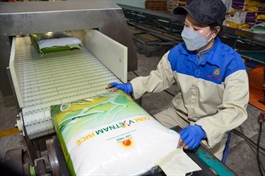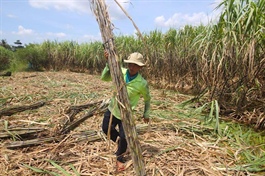US ratchets up origin-tracing on cotton materials
US ratchets up origin-tracing on cotton materials
Amidst the changing geo-political landscape, the traceability of cotton materials has become a top concern for textile exporters.

Kenneth Chan, senior director of Market Development at Renze Textile JSC, under Texhong Group, has unveiled a new process to monitor origin-tracing. A tracing system is slated to be put into operation in August for the subsidiaries of Texhong Group, after Chan informed the Vietnam Textile and Apparel Association and the American Cotton Association (CCI) at a meeting earlier in June.
Renze, one of eight Texhong member companies, is using American cotton for its products to ensure product quality and comply with strict requirements for export to the United States and EU. From March, customers were able to access the Texhong cotton tracing system to trace the details of their orders. Chan noted that Renze is focusing on sustainability and transparency. He also informed the company’s partners about key development trends as well as viable solutions for Vietnamese suppliers to meet the evolving demand.
The supply chain has been closely monitored with an increasing focus on transparency. Many brands also set a target to source sustainable cotton materials for all of their products by 2030.
According to a survey by Cotton Incorporated – a non-profit organisation funded by cotton growers in the US, 91 per cent of consumers believed that cotton and natural fibres are safe for the environment, compared with 45 per cent for polyester.
Research by the CCI showed that 61 per cent of customers pay attention to sustainable development when purchasing clothes. Two-thirds of them will make more efforts to purchase sustainable-labelled products.
According to Vo Manh Hung, representative of the CCI in Vietnam, cotton origin-tracing presents a problem for any textile exporters wishing to penetrate the global supply chain. In light of the rising demand for transparency and origin-tracing, the US Cotton Trust Protocol has set a new standard for sustainably grown cotton.
Origin guarantee will help address traceability challenges facing the global cotton industry, including reducing the risk of partners mixing cotton with lower quality materials.
Hung added that the US protocol was designed to set a new standard in more sustainably grown cotton, ensuring that it contributes to the protection and preservation of the planet, using the most sustainable and responsible techniques. It provides quantifiable, verifiable goals and measurements, and drives continuous improvement in key sustainability metrics for American cotton.
Tran Nhu Tung, chairman of Thanh Cong Textile Garment Investment Trading JSC, said that joining the US Cotton Trust Protocol offers various merits to many businesses.
The annual fee of $500 is relatively low and, along with being certified for using American cotton, Thanh Cong also receives technical support and an annual assessment of its weaknesses from the protocol to improve the quality of its supply chain.
On the same note, Cao Trung Hieu, general director of Vietnam National Textile and Garment Group, said that the US remains the largest market for Vietnam’s textile industry, followed by the EU and South Korea.
The upcoming challenge is to meet the requirements related to environmental and social responsibility, which have become the main concern for both buyers and customers in the import market.
Hieu added that in the next three years, buyers will request sellers to meet more requirements like adopting the traceability of materials and using more recycled and regenerative materials.
Other requirements are reducing the carbon footprint and chemical use of products and measuring the environmental impact of the production process, as well as ensuring a living wage and a safe working environment for workers.
In addition to the US, Hieu also cited the challenge of exporting textile products to the EU market.
Accordingly, exporters have to meet requirements related to product safety and the use of chemicals. This requirement restricts the use of chemicals in clothing and decorations, including azo dyes, flame retardants, water- and stain-resistant chemicals, and nickel.
In addition, importers may request social responsibility from sellers in compliance with the EU’s General Product Safety Directive. These regulations are always under strict control by customers – thus, Vietnamese businesses have no choice but to comply.
























